It was my chronic back pain that introduced me to acupuncture and for that I am thankful. Holistic medicine helped bring my joy in long-distance running back to me, and I’ve now made it my life’s work to help heal those who also suffer and teach those who also want to help heal.
New England School of Acupuncture
Like many Americans, I hadn’t been exposed much to this kind of medicine. Truth be told, I considered many alternative treatments for my back before before turning to acupuncture. But after only a few treatments, my back pain started to subside. And as my sense of peace and clarity increased, I knew this was the right next step in my career.
At the New England School of Acupuncture (NESA) my love for Japanese acupuncture (more on what that means in another blog!) and for Boston grew. After graduation, I joined NESA as a faculty member, teaching students and watching them find the same joy in relieving pain and bringing the peace that I felt when I first began practicing.
Non-insertive acupuncture
I have been practicing acupuncture now for over 13 years, and have had the privilege to study in both Japan and the United States. Part of what makes my practice unique is that I’ve been trained in Shakuju Therapy (SJT), which is a non-insertive form of acupuncture.
I personally remember feeling hesitant about the use of multiple needles and intense stimulation. As I learned more about how acupuncture affects the body, I realized that the same principles of healing could be applied without needing to break the skin. For someone who might have an aversion to needles to begin with, this can be a revolutionary way of understanding acupuncture.
Neighborhood treatment in Belmont and Brookline
Now, 30 years after my back pain subsided, I have been fortunate enough to operate two holistic medicine practices, one in Belmont and the other in Brookline. I have sunk my roots here in the Boston area, and I know no greater pleasure than improving the lives and well-being of those in my community.
Whether you are skeptical about how acupuncture could help you or are hopeful and want to learn more, I am an advocate for your health. The complementary therapies and health coaching I offer work as a system to improve your overall health.
If you have an existing care plan, I can integrate my work to complement what you’re already doing to improve your own well-being. This includes discussing your concerns with your other healthcare providers and helping to explain any possible side effects and interactions of medications to you.
After all, I know holistic medicine helped me, and I believe I can help you the same way.

